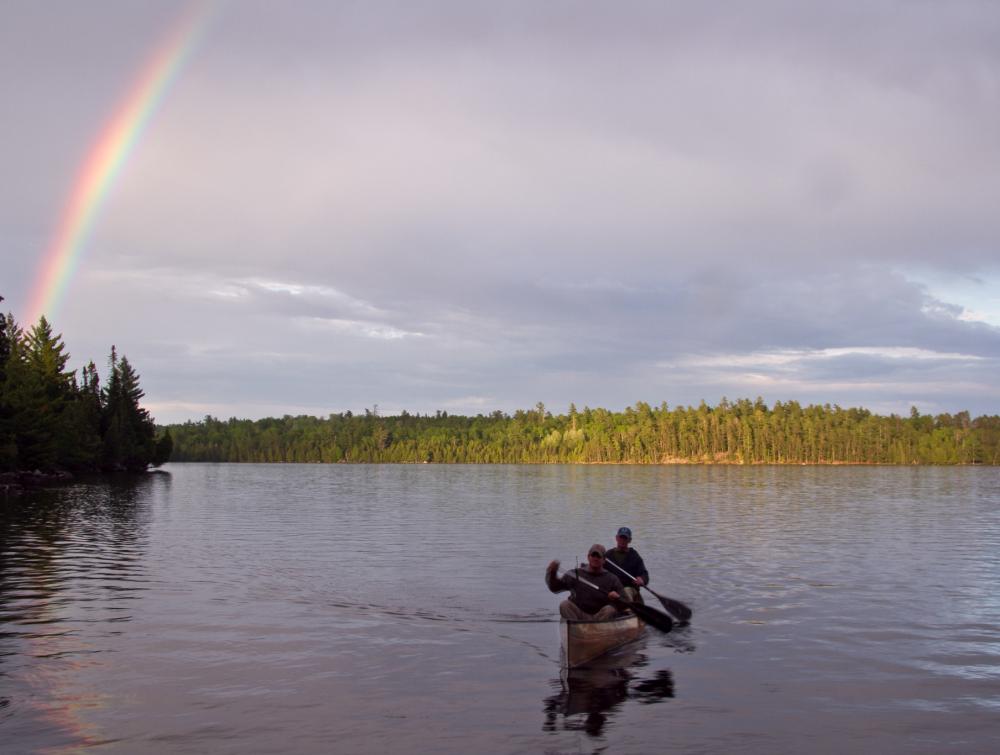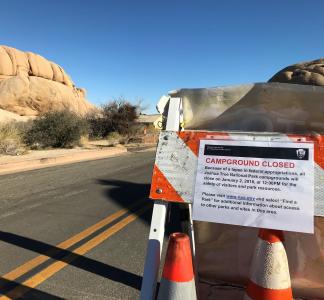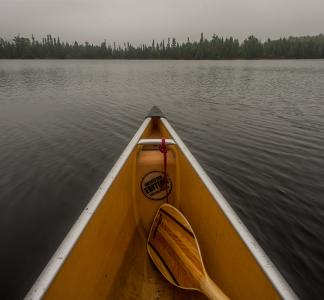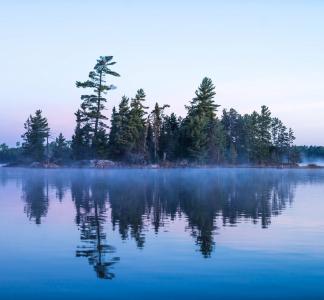Boundary Waters wilderness threatened—including by top Interior lawyer

Boundary Waters Canoe Area Wilderness, Minnesota
Alan Strakey, flickr
Jorjani’s opinion pushed mining in fragile watershed
The Boundary Waters Canoe Area Wilderness, in Minnesota’s Superior National Forest, is a cherished wildland under attack by powerful mining interests. Now, lawmakers are set to confirm the nomination of a Trump administration official who manufactured the highly suspect legal justification for that attack.
Daniel Jorjani is moving toward Senate approval to be named solicitor of the Department of the Interior, the top lawyer in charge of providing advice and legal opinions to the agency that manages national parks and most other federally administered public lands. Currently serving as Interior’s principal deputy solicitor, a post he assumed in 2017, Jorjani was the author of a legal opinion that would allow the renewal of expired copper mining leases near the Boundary Waters Canoe Area Wilderness, posing grave threats to land, water and wildlife in the region.
More: the Boundary Waters Canoe Area Wilderness is “Too Wild to Drill”
Boundary Waters Canoe Area Wilderness is the most-visited wilderness area in the U.S., and as its name suggests, one of the biggest attractions is its 1,200-mile network of canoe routes, among many other outdoor recreation opportunities. But despite its popularity, spots for solitude and reflection are plentiful, and the wilderness contains habitat for wildlife like gray wolves, lynx, otters and black bears.
For years, mining interests have been trying to develop in the watershed of the Boundary Waters. The most recent attempts come from Twin Metals Minnesota, a venture of a multi-billion-dollar Chilean mining company with ties to Jared Kushner and Ivanka Trump. Experts say the process the company would use to mine copper would discharge sulfuric acid and other harmful substances and contaminate the wilderness’ lakes and rivers. Adding to these concerns is the industry’s poor safety record; it would be effectively impossible to guarantee against accidents such as leaks in the lining of planned waste reservoirs. Add to that the Boundary Waters highly interconnected system of pristine lakes and rivers with little natural ability to buffer against acid mine drainage, and you have a recipe for permanent contamination.
Jorjani’s memorandum reversed an Obama administration decision that had defended the Boundary Waters by halting the renewal of Twin Metals’ leases. That earlier decision was based on the scientific evidence that mining in the watershed poses an unacceptable risk to the Boundary Waters. Even as Minnesotans and lawmakers representing the state cried foul, Jorjani directly paved the way for an onslaught that Harvard economists have predicted would drain jobs and income from the region by damaging outdoor recreation and overall quality of life.
Jorjani’s record at Interior favors oil, gas and mining interests
But Jorjani’s troubling influence goes well beyond the Boundary Waters. The principal deputy solicitor, who previously served as general counsel at a nonprofit with ties to the Koch brothers, has thus far issued legal opinions that uniformly benefit oil, gas, energy or extractive interests at the expense of public lands, tribes and public health. He has also contributed to a host of policies that advance the Trump administration’s destructive “energy dominance” agenda while shutting the general public out of the decision-making process. A few examples:
- Reducing protections for migratory birds. Catering to the wishes of Interior Secretary David Bernhardt, a longtime oil lobbyist, Jorjani wrote the opinion that weakened Interior’s ability to prosecute energy companies that kill migratory birds. The law he undermined had been used for 50 years to hold companies accountable when oil pits and other hazards end up hurting wildlife.
- Moving controversial water project forward. Jorjani issued the legal opinion that allowed a controversial groundwater pumping project in the Mojave Desert to move forward unchecked by federal oversight. The company Cadiz, which has ties to Bernhardt’s old law firm, wants to pump billions of gallons of water from underneath the desert, threatens desert tortoises and other wildlife.
- Signing off on Bears Ears and Grand Staircase-Escalante cuts. Jorjani approved the final unlawful reductions made by the Trump administration to Bears Ears and Grand Staircase-Escalante national monuments in 2017, which put thousands of tribal, paleontological and natural sites at risk. He was also involved in the “review” of monuments that preceded that decision.
- Proposing anti-transparency rule change. Jorjani wrote a proposed regulation that would make it harder for people to submit Freedom of Information Act (FOIA) requests to the government and easier for answering agencies to reject or ignore them.FOIA has been used by journalists, lawyers and activists to help uncover a lot of big stories, including how the Trump administration has prioritize drilling and mining in its public land decisions.
We recently led groups including the Utah Diné Bikéyah, Sierra Club and Natural Resources Defense Council on a letter asking key senators to oppose Jorjani’s confirmation [PDF]. Like Interior Secretary David Bernhardt, whom Jorjani is thought to be focused on ‘protecting,’ he is an ethically compromised DC insider whose close relationships with fossil fuel interests make him a terrible choice to ensure that decisions affecting our shared public lands and waters are lawful, ethical and transparent.
While we hope the Senate will side with the public interest and oppose Jorjani's nomination, if he is confirmed, we will be watching him every step of the way and standing up to the Trump/Bernhardt regime’s efforts to sell out wilderness in Congress, courtrooms and the court of public opinion.



